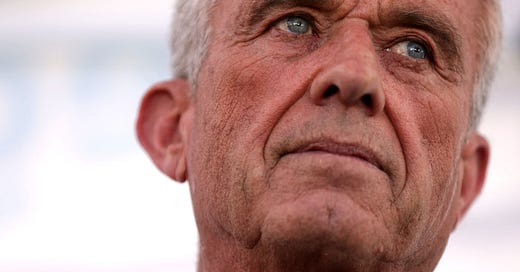Hi! We actually do not live on Substack anymore, but will occasionally be posting here to remind you to visit us at our new home. You can sign up for a membership or a free subscription, here.
Put aside the fact that the phrase “Make America Healthy Again” was, I believe, coined by the founders of Sweetgreen as a playful turn from MAGA as early as 2017. The question that matters is whether Robert F. Kennedy, Jr. is serious about attacking Big Food.
The answer to that question isn’t simple, and I suppose time will tell, but the enthusiasm from some corners about Kennedy’s “attacks” on Big Food are, I fear, misguided. Sure, the man is enigmatic (or flat-out crazy), and he is making some interesting noise, but his position on vaccines—echoed by the Trump administration, which has cut back on the routine research that updates our flu vaccines annually—will probably kill more Americans than even his most radical notions about food could hope to save.
The ages-old “GRAS” catch-all—generally recognized as safe—is part of the problem: Our food safety rules allow the inclusion of almost anything until it’s proven to actually be dangerous. But that’s an FDA regulation, and Kennedy isn’t running FDA.
Yes, I agree—and I’ll bet that you would, too—that it would be good if we stopped “using ingredients in our food that are illegal in Europe,” as RFK said on Friday. He also said that would happen, “hopefully” within two years and certainly “by the end of this four-year period.” Many of the additives used by food companies are undoubtedly harmful. (Although, in jokingly reading from a label in an attempt to demonstrate how bizarre some of these ingredients are, RFK included riboflavin, which is of course a B vitamin.) The ages-old “GRAS” catch-all—generally recognized as safe—is part of the problem: Our food safety rules allow the inclusion of almost anything until it’s proven to actually be dangerous. But that’s an FDA regulation, and Kennedy isn’t running FDA.
Questionable additives are one thing; downright unhealthy food is another. Diet-related disease— cancers related to diet as well as chronic diseases, led by diabetes, which in turn leads to other diseases —are among the leading causes of death in the United States. And those diet-related diseases are far more likely to be caused by a diet heavy in engineered ultraprocessed foods than they are by emulsifiers like Polysorbate 80, scary as it sounds.
What we need is policy that gets real, whole foods, in as close to their natural form as possible, in front of everyone, regardless of who or where they are or how much money they make.
Don’t get me wrong: I also want emulsifiers, preservatives, artificial flavors and colors, and most of the chemicals that make ultraprocessed foods possible, to be removed from our foods. I just have a hard time believing that this is anything other than tokenism. Yes, the European Union has stricter ingredient laws (and better labeling) than we do, but its citizens’ chronic disease numbers are moving in the wrong direction, as the “Mediterranean” and other traditional diets disappear before the might of Big Food. And even if you exclude the additives forbidden by the EU, there are scores more where those came from.
What we need is policy that gets real, whole foods, in as close to their natural form as possible, in front of everyone, regardless of who or where they are or how much money they make. Our agricultural policy, however, makes this all but impossible: We encourage the growth of commodity crops by farms of incomprehensible, almost unimaginable size; farms that are entirely dependent on chemical fertilizers and pesticides; farms that are essentially subsidiaries of the manufacturers of chemicals, seeds, and machinery. To function, these farms must produce crops—led by corn and soybeans—that are destined to become either ultraprocessed food or food for industrially-produced animals, which creates a host of problems, from decreasing our consumption of whole foods from the plant kingdom to accelerating climate change. (It should also be said that our agricultural policy subsidizes the use of a great deal of our farmland to produce corn for ethanol, which is not only inedible but isn’t an efficient substitute for gasoline.)
Kennedy may have food manufacturers worrying that their products may become marginally more difficult to make in the short run, but I do not believe he has them worrying about whether they’re going to have to resort to growing and selling real food.
When I hear RFK Jr.’s recommendations begin to include policy change that affects what America’s biggest farmers grow, and what most Americans eat (and when I hear him acknowledge that vaccines against measles are more effective than cod liver oil), I’ll begin to take him seriously. Until then, he’s a curiosity in an administration full of people that are perhaps less intriguing and more doltish but for the most part no more dangerous. Kennedy may have food manufacturers worrying that their products may become marginally more difficult to make in the short run, but I do not believe he has them worrying about whether they’re going to have to resort to growing and selling real food. That will take something close to a revolution, and not the kind of revolution that the MAGA/MAHA administration is giving us.





Fuck that noise. If it was a priority, Elmo would be in charge. It's not back burner. It's in the cupboard.
As crazy as the RFKjr sounds most of the time, at least there are a couple of things that make sense some of the times.